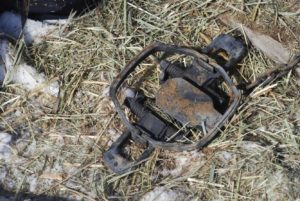Trapping ban to take effect on public lands in New Mexico

A foothold trap intended for bobcats, set by licensed trapper Tom Fisher, is shown in 2019 on the outskirts of Tierra Amarilla. It will be illegal to use wildlife traps, snares and poison on public lands across New Mexico under a ban that takes effect Friday. New Mexico is joining a handful of Western states that limit trapping on public lands. Morgan Lee/Associated Press File Photo
ALBUQUERQUE — It will be illegal to use wildlife traps, snares and poison on public lands across New Mexico under a ban that takes effect Friday.
New Mexico is joining a handful of Western states that have limited trapping on public lands, with supporters saying the move will help protect endangered species such as the Mexican gray wolf and prevent household pets from walking into traps amid efforts to promote outdoor recreation and tourism.
The New Mexico measure, dubbed “Roxy’s Law,” was approved in 2021 following several failed attempts by animal advocates over the years to rein in a practice they have described as archaic and indiscriminate.
Chris Smith with the group WildEarth Guardians was among those who lobbied for the change. He called the law a momentous win for public lands and wildlife, saying it marks a shift away from seeing native animals as a nuisance.“Native species are critical to ecosystems and cultures alike; and we are finally protecting and respecting them accordingly,” Smith said in a statement.
Trapping and snaring triggered emotionally charged debates during legislative sessions and state Game Commission meetings, with proponents and critics often being separated by a rural-urban divide.
Rural residents and wildlife conservation officers had argued trapping was an important tool for managing wildlife and protecting livestock. They unsuccessfully pleaded with lawmakers to allow more time for rules that were adopted by state wildlife managers in 2020 to work before imposing the sweeping trapping ban.
The law allows continued use of traps on public lands for purposes of scientific research, ecosystem management and rodent control. It also exempts Native American religious observances that may involve harvesting wildlife.
The law does not affect activity on private property or apply to Native American lands.
Violating the statute can result in a misdemeanor, with each trap, snare or poison application constituting a single violation of the law.
Following the 2020-2021 trapping season, environmentalists and animal advocates had counted at least nine dogs that had been caught in privately set traps and snares on public land in northern New Mexico. In February, a dog walking with its owner was caught in a snare and leg hold trap near the community of El Rito.
California and Washington have limits on trapping, but advocates say New Mexico is joining neighboring Arizona and Colorado with more restrictive rules.
In Colorado, a constitutional amendment in 1997 prohibited trapping, snares and poison on public and private land — though 30-day exceptions are granted when landowners show that livestock or crop damage can’t be prevented by sanctioned or non-lethal methods. Arizona in the 1990s banned the use of foothold traps and snares on public land with few exceptions.


